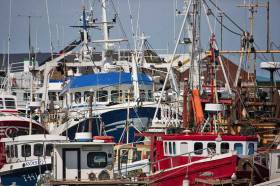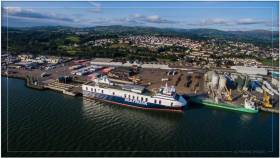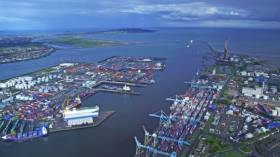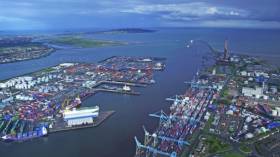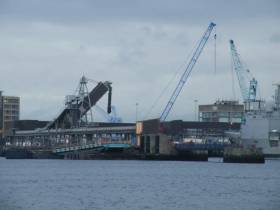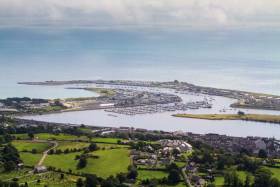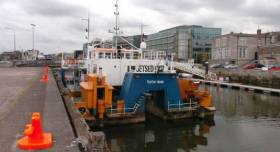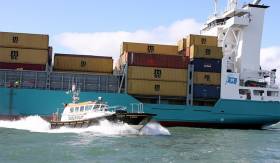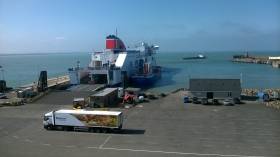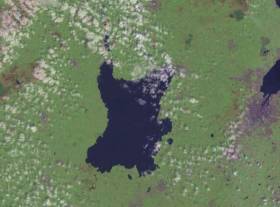Displaying items by tag: Dredging
Howth Harbour Dredging Plan Moves Step Closer With Tender For Engineering Consultants
Monday 12 November is the final date for receipt of tenders for engineering services for the long-awaited dredging of Howth Harbour.
Howth Yacht Club Commodore Joe McPeake has confirmed the date after contact with the Department of Transport, Tourism and Sport.
It is believed that consultants will be appointed within two weeks of tender closing date, and that they will engage with harbour stakeholders early in the new year to discuss issues such as minimising disruption to harbour operations, including the moorings and marina.
While no clear timeframe is available as yet, Commodore McPeake expects the initial stage towards securing licensing and planning permission to take 12 to 15 months, pending any potential challenges.
Following that, dredging works could take up to 18 months to complete, including works at both piers in Howth.
“As soon as the engineers have been appointed we will seek to meet with them to scope out their plan to methodology and review its implications for us,” said Commodore McPeake, who expects to further update Howth Yacht Club members in February.
Public Consultation: Warrenpoint Port Asks to Hear Views on Dredging Proposal
#Ports&Shipping - The second largest port in Northern Ireland, Warrenpoint Port, is inviting members of the public and other key stakeholders to comment on proposed changes to how dredged material from the harbour is dealt with.
The Co. Down port currently carries out a major dredging programme every two to five years with material disposed of in the Irish Sea.
However, new plans have been put forward to carry out dredging on a more regular but smaller scale, with material placed at a site in the mouth of Carlingford Lough between Cranfield Point and Greencastle.
Clare Guinness, CEO, Warrenpoint Port said: “In order for the Port to continue to support maritime trade successfully, it must ensure a sufficient water depth is maintained to allow for the safe berthing of vessels, which it does through dredging.
“In anticipation of a rise in trade over the coming years, and to ensure the Port continues to thrive as an economic driver to the local region, a new site for the disposal of dredged material is being proposed within the mouth of Carlingford Lough.
“This is also in line with current thinking that dredged material should be deposited as close as possible to source.
“In our role as a custodian of the marine environment, we want to hear the views of all stakeholders, including members of the public, before any plans are put into action.”
A number of surveys, studies and assessments will be undertaken to determine the suitability of the location between Cranfield Point and Greencastle, including marine ecology and sediment surveys, geophysical surveys, and hydrodynamic and sediment transport modelling.
A public drop-in consultation event will take place at Warrenpoint Town Hall on Wednesday 19th September from 4pm to 7pm. There will be an opportunity to discuss the proposed disposal site and the environmental assessment process with Port staff and its consultants Royal HaskoningDHV.
#DublinBay - The dumping of sewage sludge in deeper waters beyond the Kish Bank “might well serve as a model” for the current dredging of Dublin Port.
In a letter to The Irish Times earlier this week, Cormac F Lowth, a diver and member of the Maritime Institute of Ireland, responds to the claims of Dublin Port Company’s chief regarding the effects of recent dredging operations.
Dublin Port CEO Eamonn O’Reilly defended the dredging operations in the port, citing “the science available to measure its impact” in response to discontent among diving groups over the state of the water in Dublin Bay.
Divers concerned that the dredging is to blame for murky waters, which have seen all planned dives cancelled due to poor visibility, have however “ignored the obvious” and might now look further east for a potential answer to a question that’s left the bay’s crabs and lobsters with ‘an overcoat of silt on their backs’.
Lowth explains that dredging spoil such as that dumped at the Burford Bank at the edge of Dublin Bay contains estuarine mud and fluvial silt that “is not going to remain in toto on the top of this bank”.
“A glance at a tidal atlas for Dublin Bay is enough to convince one that much of anything that gets dumped near the mouth of the bay will get washed back in by the strong tidal currents,” writes Lowth. “This can surely be described as the maritime equivalent of defecating on your own doorstep.”
The Irish Times has more on the story HERE.
This article was updated on Thursday 17 May to correct an inadvertent misrepresentation of Cormac F Lowth's comments.
#DublinBay - Murky seawater in Dublin Bay should not be blamed on dredging, according to Dublin Port Company’s CEO.
Earlier this week, it emerged that all planned diving excursions in Dublin Bay by Irish Underwater Council members had been cancelled due to poor visibility in the water.
Dive instructor Peader Farrell pointed at dredging works to deepen the channels into Dublin Port for rendering the bay’s waters “filthy brown” and leaving crustaceans “with an overcoat of silt on their backs”.
However, in a letter to The Irish times this morning (Thursday 10 May), Dublin Port Company chief executive Eamonn O’Reilly says that the dredging operations that began last year ‘did not cause any discernible increase in turbidity above recorded background levels’, according to the port’s Annual Environmental Report.
“Dredging has been a feature of operations in Dublin Port since the early 20th century,” said O’Reilly.
“We now have the science available to measure its impact and objectively confirm that dredging in Dublin Port does not damage the environment of Dublin Bay.”
#DublinBay - All planned diving expeditions in Dublin Bay have been cancelled due to silt from dredging operations clouding the water, it has been claimed.
The Irish Times reports that Irish Underwater Council members have abandoned all scheduled dives, as a result of poor visibility from particles in the water that have also left lobsters and crabs with “an overcoat of silt on their backs”, according to one diver.
Dredging works to allow larger cargo ships and cruise liners to enter Dublin Port began in October last year, as previously reported on Afloat.ie.
But this dredging has left the waters of Dublin Bay “filthy brown, somewhere between dark chocolate and milk chocolate,” says diving instructor Peadar Farrell. “None of the local scuba diving clubs have been able to start diving as yet in 2018.”
The Irish Times has more on the story HERE.
Dredging Works at Hafan Pwllheli Marina in North Wales
Important dredging work at Hafan Pwllheli marina in North Wales has been scheduled for 2018. The plan to dredge the harbour entrance and the main channel to maintain its design depth has already been agreed. Work on clearing the entrance of silt using land-based machinery will start on 9th April. This is expected to take a few weeks.
The following month a tug boat equipped with bed leveling machinery will be employed to remove any bumps in the main channel that runs through the outer harbour. Dredging will then stop over the summer months to minimise disruption to berth holders.
More extensive dredging of the marina basin itself is then planned for October 2018. This was last carried out four years ago when 90,000 cubic metres of dredged material were removed from the harbour.
Wil Williams, Hafan Pwllheli Marina Manager said: "We are pleased to report that dredging of the entrance will begin in April, moving on to the channel levelling work in May. This is routine work and part of our ongoing maintenance programme. During the winter months we can get a build up of silt at the entrance and high spots in the channel. This has to be remedied periodically. Once this is complete, the entrance and channel will be returned to the designed depth of 0.5m below Chart Datum, providing excellent access to the marina for most yachts at virtually all states of the tide.
"Later in the year, we will commence work on dredging the inner harbour and marina basin. This is a major undertaking because boats at the marina will have to be moved to alternative pontoons during each phase of the dredging programme. However, we feel this work is important to ensure that our facilities continue to be of the highest standard."
Temporary Stink Expected As River Lee Bed is Dredged
#portofcork - Along the River Lee is where an expected stink is to eminate in the coming days as the Port of Cork dredges the riverbed.
As the Evening Echo writes, every three years the Port of Cork carries out dredging work in the harbour and the quaysides to maintain the shipping channel. The work disturbs the riverbed, dragging up sediment and releasing gases like hydrogen sulphide. While the gases are safe, they are responsible for the eggy smell that could hang over the river in the coming days.
In 2014, Barrack Street, MacCurtain Street, Shandon, North Main Street, Patrick’s Street and Merchant’s Quay were all affected by the smell as a result of dredging. However, it was thought the lack ro rain and warm temperatures exacerbated the situation at that time.
The current dredging scheme is expected to last until the end of October but the city quays portion is planned to be completed by October 9, limiting the smell in the city centre. The Port of Cork said it is taking measures to limit the impact.
For more on the dredging by clicking here.
#ShippingReview - Jehan Ashmore reviews the shipping scene from among the following stories of recent weeks.
‘Safe and sustainable’ marine transport and ‘delivery of emergency management services’ have been made a high level goal in the Department of Transport’s Statement of Strategy 2016-2019
UK shipbuilder Cammell Laird saw profits and sales fall last year – but the shipyard on Merseyside where Irish Ferries flagship Ulysses (currently drydocking) remains upbeat to win more contracts.
Ardmore Shipping Corporation the product/chemical tanker operator which has its Principal Operating Office in Cork City has made several appointments to overseas offices.
To prepare for a hard Brexit, Enterprise Ireland is advising firms here amid growing signs the British government may opt to quit the single market in order to regain full control over immigration.
County councillors from all main parties of Dún Laoghaire-Rathdown expressed concern at potential financial liabilities in the transfer of Dún Laoghaire Harbour.
In recent weeks at Rosslare Europort dredger Sospan Dau carried out work within the harbour to remove spoil offshore, benefitting not just ferries but cruiseships and timber trading cargoships.
Arklow Castle was launched in the Netherlands as the third ‘C’ class newbuild of a 10-ship order from ASL. The 5,054dwt cargoship slid into the canal at Ferus Smit shipyard in Westerbroek.
Dredging Works Completed Not Just for Ferries of Rosslare Europort
#Dredging - In recent weeks at Rosslare Europort a dredging programme was conducted within the harbour to remove spoil offshore, writes Jehan Ashmore.
Dredging operations were carried out by Sospan Dau and assistance from tug Trojan. The resultant spoil was taken offshore and near the Lucifer Bouy.
The works are to maintain sufficient depths at the ferryport's four (one not used) linkspans located on two piers. Asides the ferry industry, the Wexford port has timber trading cargoships and the first cruiseship, Braemar in two decades called last season.
In further efforts to attract business the Irish Rail operated port are to waive fees for cruiseships calling during this year's season and up to 2019.
Ferries sail to Wales and France and in the high season there are four services using three routes. They are operated by just two operators, Irish Ferries and Stena Line. Celtic Link Ferries year-round service to Cherbourg and route ship Celtic Horizon (Stena Horizon docked this afternoon in Rosslare) was acquired almost three years ago (March 2014) by the giant Swedish-owned operator.
At the height of Storm Barbara, the second of this year’s storms, Afloat noted Sospan Dau, the Boskalis operated trailing suction hopper dredger take shelter at Wicklow Port.
This saw the ship berth alongside the South Pier. It is along this breakwater during the Round Ireland Yacht Race is where crowds gather to watch the start of the biennial held event. The last such event was held last year.
Environmentalists In New Challenge Over Lough Neagh Sand Dredging
#LoughNeagh - Friends of the Earth (FoE) is appealing a ruling against its claims that Stormont is “turning a blind eye” to sand dredging in Lough Neagh, as the News Letter reports.
The environmental group brought the issue before the High Court last summer, when it described NI Environment Minister Mark Durkan’s 2015 decision to issue an enforcement notice against sand dredging, rather than an outright ban, as bringing “Northern Ireland into ridicule”.
As much as 1.5 million tonnes of sand is dredged from the lough each year, the charity has claimed, adding that dreading companies have continued the practice as their own challenge against the enforcement notice is pending with the Planning Appeals Commission.
Sand dredging has been carried out in Lough Neagh since the 1930s, and previously no planing permission was required, though the lough was designated as a Special Protection Area for wildlife in 1999.
In November, a judge rejected FoE’s High Court challenge, but the organisation has now appealed that decision.
“We believe the judge erred in law and didn’t take into account the significance of this major nature reserve,” said the charity’s NI director James Orr.
The News Letter has more on the story HERE.

